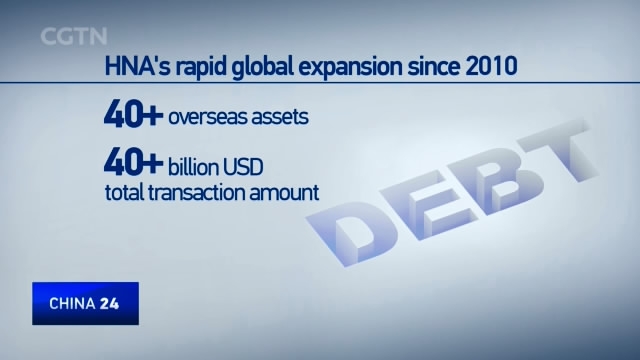
22:46, 24-Jan-2018
Overseas Debt Crisis: HNA to sell Spanish hotel stake amid debt concerns

Shares of the Hainan Airlines Group, or HNA, saw a record fall in Shanghai and Shenzhen trading. HNA fell by the 10 percent daily limit in Shanghai on Monday. The company is preparing for a major announcement regarding its refinancing plans. And it is not the only conglomerate now facing a debt crisis. ZHENG CHUNYING has the story.
With overstretched balance sheets and a government crackdown on lavish overseas spending, China's two biggest conglomerates, Dalian Wanda Group and Hainan Airlines Group, or HNA, are set to go on a selling spree.
Since 2010, HNA has acquired around 40 overseas assets to recombine and step up its global expansion and the total transaction amount has exceeded 40 billion dollars. Its assets span airlines, logistics providers, catering groups, hotels, financial institutions, and office buildings.
However, with its aggressive performance in mergers and acquisitions. The company has built up a massive debt over the past few years.
As of the end of last August, HNA spent US$2.4 billion on interest, more than any other non-financial firm, listed or unlisted, in China. And recently, the company has been struggling to meet its obligations. Shares of HNA Group saw a record fall in Shanghai and Shenzhen trading after more of the conglomerate's subsidiaries halted their stocks from trading. HNA said on Friday that it had hired banks to look for buyers of its majority stake in Spain's NH Hotel Group And the crisis is similar to the Dalian Wanda Group which is headed by Chinese billionaire Wang Jianlin.
The company has been selling off assets at home and abroad to repay debts. It agreed to sell its London luxury development project, One Nine Elms, The company's CEO has said "We will resort to every financial tool to reduce debt, including the disposal of non-core assets."
Over the past few years, China has witnessed a rapid expansion in overseas investments. From 2002 to 2016, China's overseas investments saw a yearly rise of over 35 percent. As of the end of 2016, China took up over 13 percent of the global investment flow. However, at the same time, China's corporate debt was as high as 65% of total debt. And to make the payments, perhaps more sales are going to end up happening. ZHENG CHUNGYING, CGTN.

SITEMAP
Copyright © 2018 CGTN. Beijing ICP prepared NO.16065310-3
Copyright © 2018 CGTN. Beijing ICP prepared NO.16065310-3